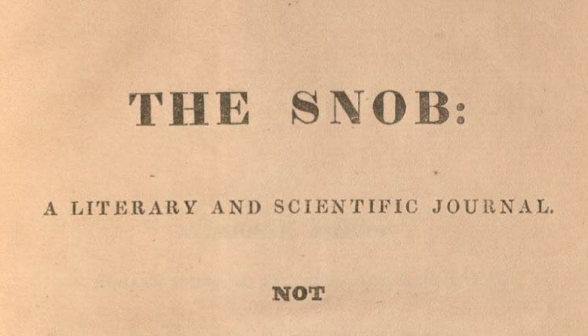Moll of Wapping: An Eastern Tale, Part 3
by Anonymous
The Snob: A Literary and Scientific Journal, vol. 1, issue 9 (1829)
Pages 49-51

NOTE: This entry is in draft form; it is currently undergoing the VSFP editorial process.
Introductory Note: “Moll of Wapping,” the longest piece of short fiction found in The Snob, was published in serial format, like many fictitious works of the period. Found in issues 4, 5, and 9, the story’s light-hearted, facetious tone and overblown verbiage are in line with the rest of the journal; tongue-in-cheek comments and satire abound. “Moll of Wapping” is essentially a nonsense story. It follows Moll, a horrendously ugly middle-aged woman, and her lover, Sooty Dobbs. The story’s depictions of a member of the lower classes by well-to-do Cambridge students are fascinating, but the tale’s true genius lies in its wit and humor.
Serial Information
This entry was published as the third of three parts:
But why should I irreverently endeavor to pourtray the exquisite beauty and contour of that angelic form, suffice it, that he was loveliness itself, the brilliant fiction of some poet’s fervid imagination embodied in perishable mortality. O that flesh were not to perish, or that that tangible quintessence of most excellent creation might have outlived the common term of years allotted to frail man. But it might not be, therefore to my tale again. Only a few words more, my beloved pen, and then shalt thou again repose amid thy feathered brethren in the inkstand of tranquillity, undisturbed by the Waterloo-crackers of controversy, unsmeared with the rhubarb-pie of wit, or the custard of romance, unstained with the inky Styx of diabolical, mechanical oratorical, and phlegmatical agency.
Well, gentle reader,—they loved, loved dearly,—loved, as mortals never loved before, or ever can again; never shall we see such purity of attachment again existing on this earth’s rotundity; never shall the little star in the left ear of the great bear look down again upon so interesting a specimen of disinterested affinity. No sooner, therefore, did his eye’s pupil discover that it was the sunshine of Moll’s beauty that tipped with gold his donkey’s auricular hairiness, than he put his shoeless heel in closer contact with its side, and urged him onwards by a kick’s grim potency. By this manoeuvre, as cobbler dauntless and as his wax close-sticking, Dobbs swiftly galloped to his love; and first reining in his asinine precipitance, he then rained dewy kisses on her pouting lips, while she with mutual affection elevated, kept osculating his phiz’s rouge et noir.1“Phiz” means face. The salutation over, arm in arm they tread the dreaming street, but which still dreamt not of their glorious appearance; they move slowly on, he with soft whispers urging her gentle soul to ecstacy’s sweet madness, and she with enviable, coquetting quietness, as if unconscious of his love-pregnant converse, still smoking shag.
But now near to the climax of my tale I draw; O
“’Tis a consummation
“Devoutly to be wished.”2Another reference to Hamlet III.i.73-74.
for its a sad tale, a tale of wretchedness and woe, and while I write, the sympathetic dews of nature rain from my eyes’ bright azure, staining the whiteness of the page before me. See, see, they draw near the fatal pond! O black-mudded creation of a filthy scavenger! O beastly conglomerations of numberless disgusting existences! Foul spot in Wapping-fields! Horrible shadow! — Type of the common drain of Erebean nuisances, those all-but-solid streams that give an atmosphere of palpable stench and horror to the infernals! O dirty pond! why wert thou born? Why didst thou from the cart of scavenger fling thy dark bubbling putridity into that yawning hole? Why wert thou permitted to exist only to ensnare the lovely?
Immersed in pleasing thought neither saw the Stygian ditch, but while he was gazing rapt in fancy’s brightest hopes upon her, her blind foot slipped, and oh Heavens! how can I recount it, she, the brilliant, the adorable, the heavenly, the angelic, the seraphic, she fell in. But to make short of the horrible tale, he, mad with anguish, mounted his startled donkey, put spurs to its side, and Curtius-like plunged in after her. The black flood closed over them, and they were seen no more, except that every anniversary of that dread circumstance the donkey’s tail, radiant with thousand flies,
“——moves in track of shining white,
“And when it rears, the elfish light
“Falls off in hoary flakes,”
and the phosphorescent ghosts of putrid sprats gleam on the slimy deep, while brays of pain and mingled sorrow scare the silence of midnight; and yells of demons tell to man, that Sooty Dobbs and Moll of Wapping sleep in the darkness of that filth.3Quote from Coleridge’s “Rime of the Ancient Mariner,” Part 4, lines 275-277.
Original Document

Topics
How To Cite
An MLA-format citation will be added after this entry has completed the VSFP editorial process.
Editors
Amanda Seeley
Cosenza Hendrickson
Alexandra Malouf
Posted
11 January 2021
Last modified
5 December 2023
Notes
TEI Download
A version of this entry marked-up in TEI will be available for download after this entry has completed the VSFP editorial process.



